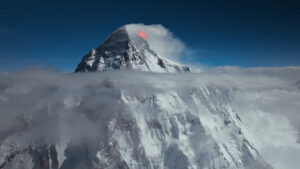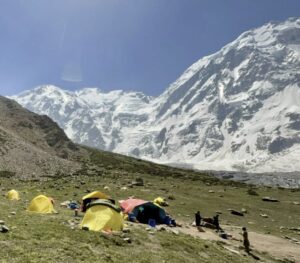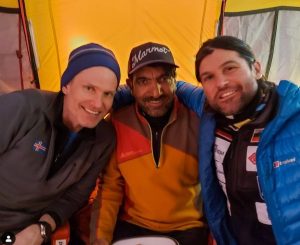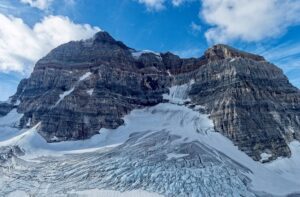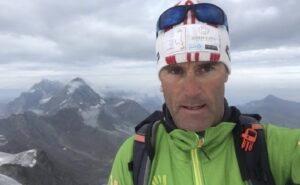Five more climbers summited Broad Peak this afternoon. The Imagine Nepal team included Phur Galjen Sherpa, Pemba Tshering Sherpa (both Nepal), Tobias Schwab (Germany), Hari Thomas Mix (USA) and Sirbaz Khan (Pakistan).
On Gasherbrum I (Hidden Peak, 8,068m), three teams left yesterday on a summit push via the Japanese Couloir. Sophie Lavaud of Switzerland Sand Dawa Sangay of Nepal (both with Seven Summit Treks) topped out, along with a multinational potpourri of climbers from Turkey, China, Bulgaria, Nepal and Pakistan. For Tunc Findic of Turkey, it was his 13th successful 8000’er. Only Nanga Parbat remains.
Intriguing news from Nirmal Purba, currently in Gasherbrum Base Camp: Although reticent about his recent climb of Nanga Parbat — “for security reasons,” he says cryptically — he has boldly announced on Facebook that he intends to climb GI, GII and K2 within a week.

Gasherbrum I summiters Dawa Sangay and Sophie Lavaud. Photo: Seven Summit Treks
The elusive Gasherbrum VI
Meanwhile, Jerzy Natkański is leading fellow Poles Jacek Paweł Czech, Jarosław Botor and Dominik Malirz on an attempt to complete the first ascent of Gasherbrum VI. Organized by the Jerzy Kukuczka Foundation, the expedition will set Base Camp in the middle of the Gasherbrum circus (among the commercial teams targeting the “bigger” Gasherbrums), in order to climb from the peak’s south side.

The formidable and unclimbed Gasherbrum VI. Photo: J.Carlos Garranzo
They have not yet publicly shared their line, but the most obvious route goes up the Southeast Wall, which has been attempted several times but never completed. A 1993 try by Walter Hölzler and partners failed because of high avalanche risk. This inherent danger in the line showed its teeth five years later, when a slide at 6,900m caught a French party, killing one member. In 2016, Nancy Hansen and Ralf Dujmovits couldn’t find a safe route to the top.
Daniela Teixeira and Paulo Roxo of Portugal went a little further in 2009 via the east side. The climbing couple retreated shortly before the summit ridge. “The obvious route is up the south side, which rises next to Gasherbrum Base Camp,” Teixeira told ExplorersWeb. “It looks great, but conditions must be checked carefully. Although the face is very steep, it tends to accumulate snow, and the avalanche risk is very high.”
She added: “This is why we tried the east side. Our problem was rotten rock, and in the steep upper sections, powder and unstable snow where we could not place protection. Huge cornices hung from the ridge above.”
Given the sustained good weather so far this summer, expect further news from the Poles in the days to come.

